Strikes In Support Of Nationwide Protests Gaining Momentum In Iran

Workers in many industries have joined the strikes which have been gaining momentum since last week as Iran’s antigovernment protest movement has entered its second month.

Workers in many industries have joined the strikes which have been gaining momentum since last week as Iran’s antigovernment protest movement has entered its second month.
On Tuesday, the workers of Haft-Tappeh Sugarcane complex in the southwestern Khuzestan province joined the strikes in oil, gas, and petrochemical sectors in southern Iran.
Workers of several phases of South Pars Gas-Condensate field, Bushehr Petrochemical Company and Hengam Petrochemical Company -- both of which operate at Asalouyeh Complex -- Abadan Petrochemical company and refinery, Mahshahr’s refinery and Pipe Mill Plant, as well as Neyriz Ghadir Steel Complex off the coasts of the Persian Gulf have been on strikes in solidarity with the protests across Iran, ignited by the death in custody of 22-year-old Mahsa Amini.
At least 100 striking employees of Assalouyeh petrochemical plant have been arrested in the past few days while many are threatened with being fired or replaced by Chinese workers if they do not break their strike.
The government has blocked access to mobile Internet to prevent videos of the strikes from being posted on social media.
Security agents have summoned many workers to force them into confessing that the strikes are because of long overdue wages, and not in support of the antigovernment and anti-hijab protests. Although it is a fact that many of the workers have not been paid for months, they have repeatedly announced that their strike is in opposition to the heavy-handed crackdown on protesters.
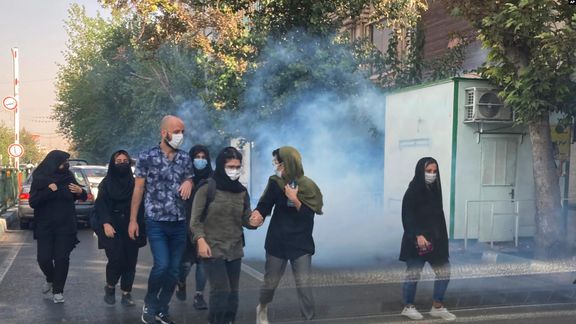
The antigovernment movement in Iran continued Monday with demonstrations at universities, clashes on streets and strikes of workers of petrochemical plants in the south.
Protests started Monday morning in several universities across the country. According to social media videos, the clashes at the Social Sciences Faculty of the University of Tehran were so violent that people compared them with the incidents at the Sharif University earlier in October in which a large number of students were beaten and arrested.
Security forces in the University of Mazandaran in northern Iran violently cracked down on a demonstration by students who were chanting to gather support for the protests.
Azad University of Shahr-e Kord, the capital city of Chaharmahal and Bakhtiari province, the Art University of Tabriz in northwestern Iran, the Persian Gulf University in the southern province of Bushehr and Ardabil University of Medical Sciences were also scenes of gatherings by students who were chanting antigovernment slogans.
Later Monday evening, security forces were reported to have attacked women’s dormitories in the city of Rasht in northern Gilan province, beating and terrifying the students.
In addition to university students, high schoolers have also joined the protests – sparked by the death in custody of Mahsa Amini, a 22-year-old girl from the Kurdish majority city of Saqqez.
Schoolgirls have become especially engaged in the protests since the death of a student, identified as Asra Panahi, who died of internal bleeding after she was beaten by Basij paramilitary forces who attacked their school in the city of Ardabil. School officials tried to force the students to sing the propaganda song “Hello Commander” in praise of Iran’s ruler Ali Khamenei, but when some students refused, government agents showed up, beating and assaulting the girls. Another student is reportedly hospitalized in critical condition.
In several cities, including the capital Tehran and Karaj, schoolgirls are seen spraying black paint on pictures of Supreme Leader Khamenei, and replacing it with a photo of Mahsa Amini.
The nationwide protests are backed by many workers in the oil industry who have been holding strikes for at least a week now. At least 100 striking employees of Assalouyeh petrochemical plant off the coasts of the Persian Gulf have been arrested in the past few days while many are being threatened to be fired if they do not break their strike. Despite the threats, more sections of the company announced on Monday that they will join the strikes on Tuesday.
The streets in many cities were also the battleground between people and security forces on Monday from noon through the night, with reports of bloody skirmishes in the city of Abdanan, located in the south of Ilam province, and Piranshahr in in West Azarbaijan province as well as Zahedan, the capital of Sistan and Baluchestan Province.
A video from the central province of Esfahan showed a man throwing a Molotov cocktail at the entrance of the seminary of the city of Fouladshahr.
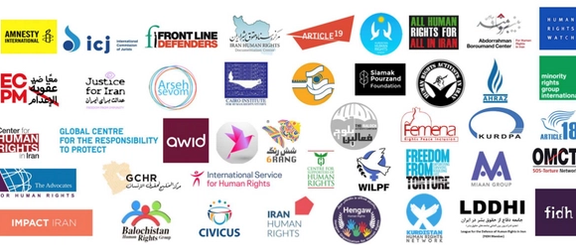
A group of 43 civil and human rights organizations and NGOs have called on UN Human Rights Council to hold a special session on ongoing rights violations in Iran.
In a joint statement on Monday, they expressed deep concerns about the Iranian authorities’ mobilization of their well-honed machinery of repression to ruthlessly crackdown on the current uprising, sparked by the death in custody of 22-year-old Mahsa Amini.
Stressing the urgency for the establishment of an independent, investigative and accountability mechanism, they said The United Nations Human Rights Council should act promptly considering the gravity of crimes under international law and other serious human rights violations committed in Iran and the prevailing systemic impunity.
According to evidence gathered by a number of the signatories of the statement, there is a harrowing pattern of Iranian security forces deliberately and unlawfully firing live ammunition and metal pellets, including birdshot, at protesters and bystanders including children.
Voicing concerns over the growing numbers of protesters and bystanders killed, they said the number of casualties is likely to be much higher than the reported 200 deaths, including at least 23 identified children.
Since 18 September 2022, over one thousand protesters, human rights defenders, civil society activists, journalists, university students and school children have been arbitrarily arrested and detained, some already charged with “acting against national security,” describing the “cycle of deadly repression” alarmingly similar to previous waves of mass protests including in December 2017-January 2018, November 2019, July 2021, November 2021 and May 2022.
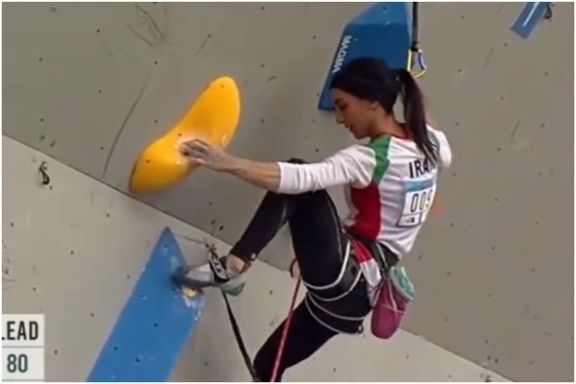
Iranian athlete Elnaz Rekabi who represented Iran at the Asian Climbing Competitions finals in Seoul, competed without hijab, disobeying the Islamic Republic's restrictions for female athletes.
Rekabi, 33, made the symbolic gesture in support of anti-hijab and antigovernment protests that have been raging across the country since mid-September, when 22-year-old Mahsa Amini was killed in custody of hijab police.
Her move prompted widespread reactions from Iranians and foreigners, while people on social media are organizing a huge gathering to welcome her early on Wednesday morning when she is scheduled to arrive back in the country. People are worried that she would be arrested upon arrival. According to reports, the authorities have moved to transfer Rekabi to Tehran ahead of schedule so people cannot gather for her arrival.
Moved by Rekabi’s act of defiance, activists and social media users are praising her move as a “Very powerful statement” that may bring about serious repercussions for her from the authorities.
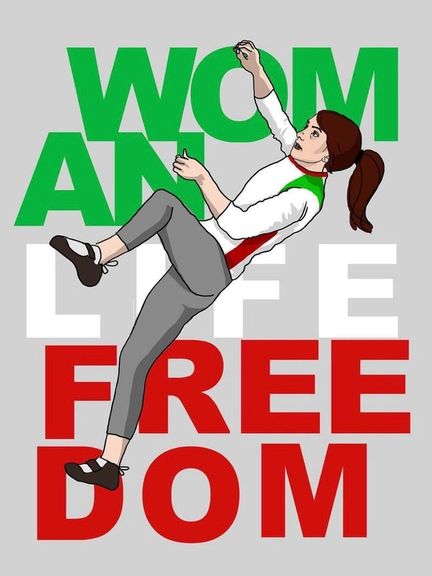
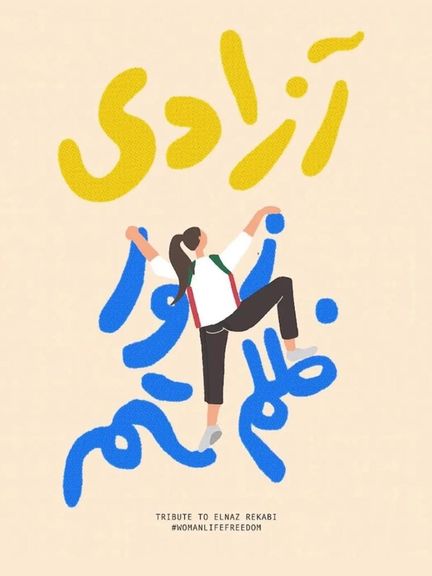
She previously won a bronze medal for boulder climbing at last year's competition and she has won more than 80 medals over the course of her career.
In 2019, boxer Sadaf Khadem attended a boxing match with the Iranian flag and without a headscarf. She had to cancel her return flight to Tehran after a warrant was issued for her arrest.
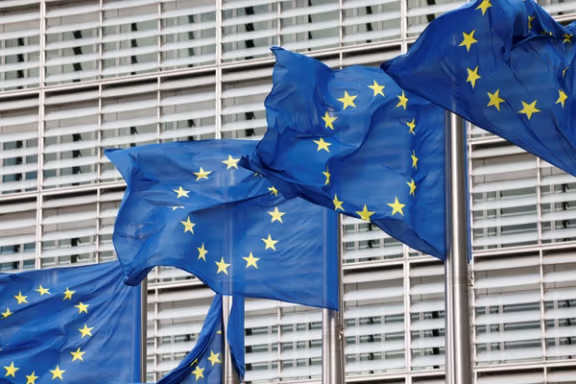
The Council of the European Union has imposed sanctions against 11 Iranian individuals and four entities for their role in the death of Mahsa Amini and the crackdown on the ongoing protests.
The European Council, the institution that defines the general political direction and priorities of the European Union, added on Monday 11 individuals and four entities to the EU list of those subjected to restrictive measures in the context of the existing Iran human rights sanctions regime, a statement released Monday said. The EU list now comprises a total of 97 individuals and eight Iranian entities.
"The EU and its member states condemn the widespread and disproportionate use of force against peaceful protestors. This is unjustifiable and unacceptable. People in Iran, as anywhere else, have the right to peacefully protest and this right must be ensured in all circumstances," the statement read.
The latest measures consist of a travel ban and an asset freeze, in addition to prohibiting EU citizens and companies from making funds available to the listed individuals and entities.
The sanctions also include a ban on exports to Iran of equipment which might be used for the repression of protests and of equipment for monitoring telecommunications and surveillance.
"The EU expects Iran to immediately stop the violent crackdown against peaceful protesters, to free those detained, and to ensure the free flow of information, including internet access. Furthermore, the EU expects Iran to clarify the number of deaths and arrested," the EU said.
The new designations include Iran’s so-called ‘Morality Police’ and two of its key figures, Mohammad Rostami and Haj-Ahmad Mirzaei. In addition, the EU has designated Iran's police, known as the Law Enforcement Forces, as well as several of its local chiefs for their role in the crackdown on the protests.
The EU has also sanctioned the minister of information and communications technology, Issa Zarepour, for shutting down the internet to restrict access to information on the protests and impede communication among protesters.
Announcing “unanimous” decision to take action against those “responsible for the death of Mahsa Amini and violent repression of peaceful protests” in a tweet Monday, the EU Foreign Policy Chief Josep Borrell stressed that the EU will always act against serious human rights violations.
Borrel also said on Monday that he currently did not expect progress in negotiations over reviving the 2015 nuclear deal with Iran. "I don't expect any move, that's a pity because we were very, very close," he said.
Iran-European Union relations have soured with claims Tehran has supplied Russia with armed drones used in Ukraine, although the EU is not yet expected to agree new sanctions.
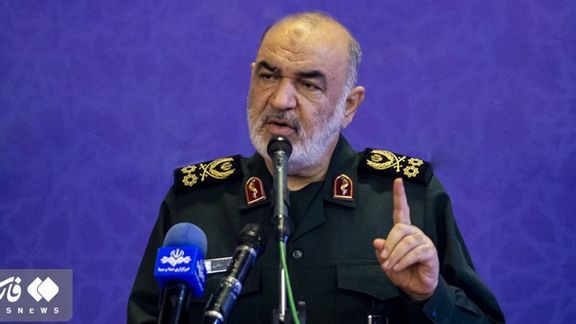
Commander of Iran’s Revolutionary Guard Hossein Salami has threatened Riyadh over the coverage of nationwide protests in Iran by the media it allegedly controls.
Salami claimed that Saudis are trying to provoke the Iranian youth, threatening that if they do not control their media the consequences will be unavoidable.
Speaking at a wargame staged by the IRGC ground forces near Aras region in the northwest of Iran, he said Saudis are seeking to “deceive Iranian youths by some media.”
“This is our last warning, because you are interfering in our internal affairs through these media, we told you, be careful,” added Salami.
He further said that Iran’s policy with neighbors is based on “friendship and good neighborliness” as well as “correct political interaction,” but if the neighbors endanger the security of the Iranian nation and country, Tehran’s policy will change too.
Salami’s statements are the last among several threats by the Iranian regime officials against the Persian-speaking media based outside the country like the BBC Persian, Manoto TV, Iran International and the VOA.
This comes as the clerical regime is constantly threatening families and relatives of the correspondents of these networks who reside in Iran and jams satellite television signals to limit access to their programs.
Many journalists and media activists have also been arrested in Iran after the new wave of anti-regime protests in a move to suppress the circulation of information.